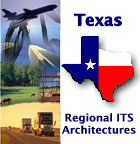| 4.0 | COMMERCIAL VEHICLE OPERATIONS |
| 4.1 | COMMERCIAL VEHICLE ELECTRONIC CLEARANCE |
| 4.1.1 | CVEC shall include a Fixed Facility consisting of those structures and equipment to include Ports Of Entry, Inspection Stations, Weigh Stations and Toll Booths. |
| 4.1.1.1 | Fixed Facility shall provide the capability for state participation in the CVEC program to be voluntary. |
| 4.1.1.2 | Fixed Facility shall provide the capability to support the enrollment of vehicles/carriers in the CVEC program. |
| 4.1.1.3 | Fixed Facility shall provide the capability to accommodate both interstate and intrastate vehicles/carriers. |
| 4.1.1.4 | Fixed Facility shall include processing to issue pull-in for safety inspection signals of the following type: |
| 4.1.1.4(a) | Automatically generated from Pass/Need To Stop tests. |
| 4.1.1.4(b) | Randomly generated. |
| 4.1.1.4(c) | Manually generated. |
| 4.1.1.5 | Fixed Facility shall provide the facility operator the capability to manually override the issuance of automatically and randomly generated Pull-In requests. |
| 4.1.1.6 | When making the "Pass/Need To Stop" determination the Fixed Facility shall perform checks on the following: |
| 4.1.1.7 | Fixed Facility shall provide the capability to establish two-way communications with each vehicle approaching the facility. |
| 4.1.1.8 | Fixed Facility shall include the capability to access and quickly update information on vehicle problems that are detected. |
| 4.1.2 | CVEC shall include a Vehicle System capability |
| 4.1.2.2 | Vehicle System shall provide the capability for each vehicle to establish two-way communications with fixed facilities. |
| 4.2 | AUTOMATED ROADSIDE SAFETY INSPECTION |
| 4.2.1 | The ARSI capability shall include a Roadside Facility (RF) function that improves the ability to perform safety inspection through the use of automation. |
| 4.2.1.1 | RF shall provide a processing capability that automates the roadside inspection tasks. |
| 4.2.1.2 | RF shall include the capability to perform brake inspections at the roadside. |
| 4.2.1.3 | RF shall include the capability for operators to use hand held devices to rapidly inspect vehicle and driver components that produce the following: |
| 4.2.1.3(a) | Pass/Fail results. |
| 4.2.1.3(b) | Data on actual condition. |
| 4.2.1.3(c) | Data on expected life projections. |
| 4.2.1.4 | RF shall collect, store, maintain and provide real-time on-line interactive access to historical safety data at the roadside facility. |
| 4.2.1.6 | RF shall provide the capability to automatically identify to the enforcement personnel approaching vehicles that have been flagged as potentially needing maintenance or put out of service. |
| 4.2.1.7 | RF shall provide the capability to receive identification data from each vehicle that is stopped at the inspection station that enables the access and receipt at the roadside of historical safety records to include the following: |
| 4.2.1.7(a) | Carrier. |
| 4.2.1.7(b) | Vehicle. |
| 4.2.1.7(c) | Driver. |
| 4.2.1.7(d) | Cargo. |
| 4.3 | ON-BOARD SAFETY MONITORING |
| 4.3.1 | OBSM shall include a Fixed Facility (FF) capability for the analysis and control of safety information. |
| 4.3.1.1 | The FF shall provide the capability to analyze data received from each vehicle approaching and determine the identification of: |
| 4.3.1.1(a) | Vehicle. |
| 4.3.1.1(b) | Driver. |
| 4.3.1.2 | The FF shall provide the capability to provide warnings of any safety problem that has been identified. |
| 4.3.1.3 | The FF shall provide capability to log the passing of each vehicle and the associated results from the decision of whether to request the vehicle to pull in or continue without stopping. |
| 4.3.1.4 | The FF shall provide the capability to automatically make a decision as to whether to allow each vehicle to pass or require them to stop for a check. |
| 4.3.1.5 | The FF shall provide the capability for enforcement officials to manually override the automatically generated decision for vehicles to pull-in for safety inspection. |
| 4.3.1.6 | The FF shall provide the capability to perform pre-trip and post-trip inspections of each vehicle. |
| 4.3.1.7 | The FF shall provide the capability to have two-way data exchange between the Roadside facility and each vehicle. |
| 4.4 | COMMERCIAL VEHICLE ADMINISTRATIVE PROCESSES |
| 4.4.2 | CVAP shall include an Automated Mileage and Fuel Reporting and Auditing (AMFRA) function that includes but is not limited to the following: |
| | |












 Web Spinner Technology.
Web Spinner Technology.